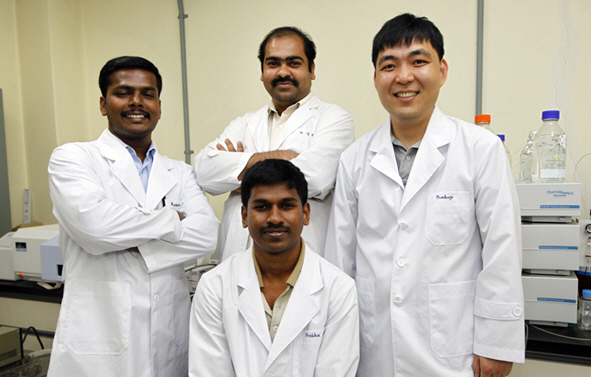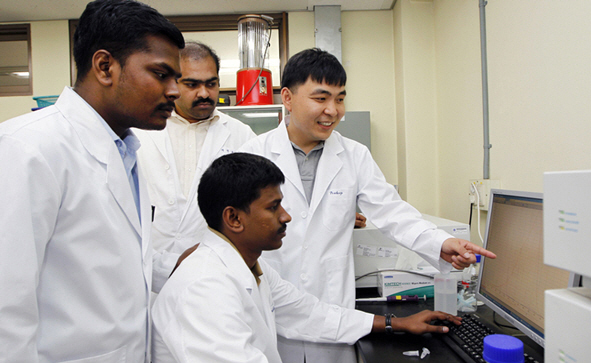The Team of Professor Yoon, Hyung-Don of Biotechnology Department, Develops a Heavy Metal Bio Sensor N
No.88431- Writer YU
- Date : 2012.01.11 14:36
- Views : 11315
Team of Professor Yoon, Hyung-Don of Biotechnology Department
Published on a famous international journal called 《Angewante Chemie》 of 11.8 impact factor in the field of chemistry
[June 22, 2011]

The team of Professor Yoon, Hyung-Don that has developed a heavy metal bio sensor
(Clockwise from the right-Professor Yoon, Prabhu, Deepankumar, Professor Ayyadurai)
A bio sensor that can measure detect incurable diseases such as Alzheimer\'s diseases or Wilson\'s disease and promptly-simply measure the level of soil contamination has been developed by a Biotechnology Department research team of Yeungnam University.
According to Yeungnam University on 22nd, the team of Professor Yoon, Hyung-Don of Biotechnology Department has developed a bio sensor to see the change of \'copper\' (Cu) content with your eyes by adopting unnatural amino acid ‘L-DOPA’ in Green Fluorescent Protein using genetic-code engineering. The thesis related to this was issued on June online edition of a famous international journal called 《Angewante Chemie》with impact factor as high as 11.8 in the field of chemistry.
Copper is one of microelements playing an important role inside animals and plants. Especially, the deficiency of this causes anemia, bone disorder or nerve disorder, etc in human body and the intake must be limited in case of Wilson\'s disease. It also becomes a quite important index indicating the level of soil contamination. Therefore, while measuring the amount of copper contained inside the body or soil is very important for the diagnosis and treatment of diseases or improvement on soil contamination, a simple and prompt measurement is made possible through this research.
Especially, the new technology of Professor Yoon\'s team is noteworthy from the fact that it has increased the utilization of Green Fluorescent Protein even more. Green Fluorescent Protein is widely used in measuring the revelation degree of genes in living cells, protein-protein interaction, structural change of protein and in measuring the location of protein, etc. It became a candidate for Nobel Prize in Chemistry in 2008 due to such importance. But the research of Professor Yoon\'s team is primarily the bio sensor on a specific heavy metal called \'copper\' and the opened possibility of developing and utilizing as a bio sensor reacting to heavy metals other than copper.
Professor Yoon, Hyung-Don (35) has expressed his expectation by saying “not only the research has illustrated a new methodology in the development of a bio sensor that can measure more promptly-accurately just with small amount of heavy metal content which is the main culprit of various diseases in modern people and environmental pollution, but it will also develop as a new technology of selectively extracting-removing only specific heavy metals in case of adopting the unnatural amino acid combining with other metals from its combining ability”

Meanwhile, Yoon, Hyung-Don had completed bachelor\'s, master\'s and doctorate at the chemical engineering department of Seoul National University and currently working as a biotechnology professor of Yeungnam University since September, 2007 after going through post-doc at the biology department of MIT in the United States. So far, he has presented about 20 theses on SCI level journals such as 《Chemical Communications》 or 《Bioconjugate Chemistry》 and was recognized for the outstanding academic ability as he received the \'rookie academic award\' from the Korean Society of Biotechnology and Bioengineering at the end of last year.
This research was performed for 2 years as Professor Ayyadurai (N. Ayyadurai, 33) from India researching and lecturing at the Biotechnology Department of Yeungnam University , Prabhu (N.S. Prabhu, 26) of doctorate program, Deepankumar (K. Deepankumar, 24), Professor Lee, Chang-Su of Chungnam National University and Professor Lee, Seon-Gu of Pusan National University have participated as joint researchers since 2009.